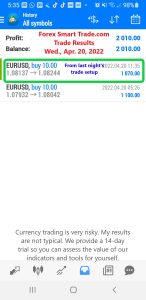Forex Trade Results April 20, 2022 – $2,010.

Forex Trade Results April 19, 2022 – $6,689.
April 19, 2022
Forex Trade Results April 21, 2022 – $5,643.
April 21, 2022How to Read a Forex Quote.
Let’s examine how to read a forex quote.
Currencies are always quoted in pairs, such as GBPUSD or USDJPY.
The reason they are quoted in pairs is that, in every foreign exchange transaction, you are simultaneously buying one currency and selling another.
This is where the concepts of base and quote currencies come in…
Base and Quote Currency
Whenever you have an open position in forex trading, you are exchanging one currency for another.
Currencies are quoted in relation to other currencies.
Here is an example of a foreign exchange rate for the British pound versus the U.S. dollar:
GBPUSD = 1.21228
The first currency is the BASE currency.
The second currency is the QUOTE currency.
The first listed currency is known as the base currency (in this example, the British pound).
The base currency is the reference element for the exchange rate of the currency pair. It always has a value of one.
The second listed currency on the right is called the counter or quote currency (in this example, the U.S. dollar).
When buying, the exchange rate tells you how much you have to pay in units of the quote currency to buy ONE unit of the base currency.
In the example above, you have to pay 1.21228 U.S. dollars to buy 1 British pound.
When selling, the exchange rate tells you how many units of the quote currency you get for selling ONE unit of the base currency.
In the example above, you will receive 1.21228 U.S. dollars when you sell 1 British pound.
The base currency represents how much of the quote currency is needed for you to get one unit of the base currency
If you buy EURUSD this simply means that you are buying the base currency and simultaneously selling the quote currency.
Thus, “buy EUR, sell USD.”
- You would buy the pair if you believe the base currency will appreciate (gain value) relative to the quote currency.
- You would sell the pair if you think the base currency will depreciate (lose value) relative to the quote currency.
With so many currency pairs to trade, how do forex brokers know which currency to list as the base currency and the quote currency?
Fortunately, the way that currency pairs are quoted in the forex market is standardized.
“Long” and “Short”
First, you should determine whether you want to buy or sell.
If you want to buy (which actually means buy the base currency and sell the quote currency), you want the base currency to rise in value and then you would sell it back at a higher price.
In trader talk, this is called “going long” or taking a “long position.” Just remember: long = buy.
If you want to sell (which actually means sell the base currency and buy the quote currency), you want the base currency to fall in value and then you would buy it back at a lower price.
This is called “going short” or taking a “short position”.
Just remember: short = sell.
Flat or Square
If you have no open position, then you are said to be “flat” or “square”.
Closing a position is also called “squaring up“.

Learn to Day Trade
If you’d like to earn extra income trading on the Forex market, consider learning how to currency trade with Forex Smart Trade. With their super-accurate proprietary trading tools and best-in-the-business, personalized one-on-one training, you’ll be successful. Check out the Forex Smart Trade webinar. It shows one of their trader’s trading and how easy, intuitive, and accurate the tools are. Or try the Forex Smart Trade 14-day introductory trial for just TEN dollars.


